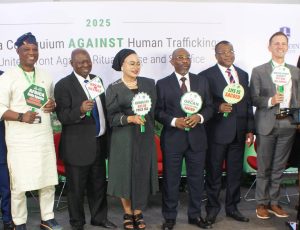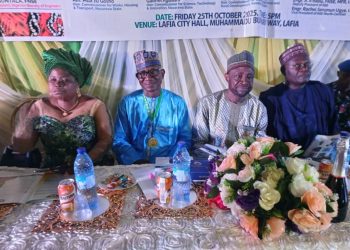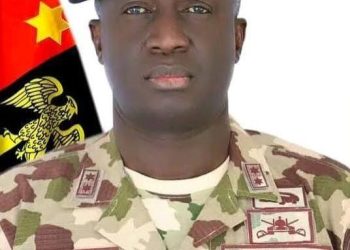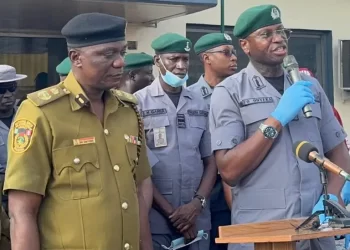
Under the soft lights of the Radisson Blu Hotel in Ikeja, Lagos, voices from across Africa rose with one purpose — to reclaim the continent’s humanity. It was not just another conference. It was a continental awakening.
At the First Annual Africa Colloquium Against Human Trafficking, African leaders, justice reformers, and survivors gathered to confront one of the darkest wounds haunting the continent — the twin evils of human trafficking and ritual abuse.
“A United Front Against Ritual Abuse and Sacrifice”
Representing Lagos State Governor Babajide Sanwo-Olu, the Secretary to the State Government, Mrs. Abimbola Salu-Hundeyin, stood before the packed room and delivered a message that cut through statistics and policy jargon.
“Human trafficking is not an abstract problem — it is real and close to home,” Sanwo-Olu said. “It affects millions across Africa, especially women and children, through forced labour, sexual exploitation, domestic servitude, and ritual abuse. Behind every statistic is a name, a face, and a story of pain we must never ignore.”
For the Governor, the issue is not only legal or moral — it is deeply human. He called for a continental coalition, urging African nations to rise above borders and bureaucracies to protect their people. “This evil knows no boundaries,” he said. “It can only be defeated through shared action, intelligence, and compassion.”
In Lagos, he noted, the state’s Task Force Against Human Trafficking has intensified its work with NAPTIP and international organisations, expanding survivor care and prosecution of offenders. “The government alone cannot win this fight,” he added. “It demands a coalition — of justice ministries, law enforcement, community leaders, and faith-based groups.”
For Justice Kazeem Alogba, Chief Judge of Lagos State, the menace of trafficking and ritual abuse is not new. It is a grim continuation of Africa’s colonial past.
“Centuries after slavery was abolished, its modern offshoots — human trafficking, ritual killings, and organ trade — still thrive under new guises,” he said. “At its core, trafficking remains a business — a transaction driven by profit.”
But the judge’s greatest concern is cultural complicity. “Our beliefs must be interrogated,” he warned. “No matter how it is rationalized, the use of human beings for rituals is evil. The fight must start from our communities.”
He urged citizens to become their “neighbour’s keeper,” noting that traffickers are now sophisticated and well-funded. “We must be just as organized in our response,” he said firmly.
From the federal level, Mrs. Ezinne Nwaokoro, representing the Attorney-General of the Federation Prince Lateef Fagbemi (SAN), shared the painstaking work of the Ministry of Justice in cross-border trafficking cases.
She recalled one particularly haunting case: a Nigerian woman lured to the UAE with a fake job offer, only to be forced into prostitution. After months of legal coordination, the trafficker was extradited back to Nigeria. “It proved that when systems cooperate and justice persists, the vulnerable can find protection,” Nwaokoro said.
Her voice softened as she described a darker side of trafficking — the use of ritual oaths and psychological bondage. “Victims are often made to undergo rituals designed to enslave them mentally,” she explained. “This is no longer just exploitation of poverty — it’s exploitation of belief.”
From the academic front came a call to courage. Prof. Cameron Collum, Director of Pepperdine University’s Sudreau Global Justice Institute, called ritual abuse “pure evil” — a moral crisis that Africa must face together.
“Everywhere I go, leaders acknowledge ritual killings as real — yet few programs address them,” he said. “This conference aims to change that.”
Collum explained that Pepperdine’s partnership with African nations began in Uganda, where legal reforms once helped free thousands of juveniles from prolonged detention. That success, he said, can inspire the same transformation against ritual crimes.
“This is not a talking session,” he told the audience. “We want to leave Lagos with concrete action steps that every country can take home.”
The Scholar pleaded for unity among Africans, while urging the people to see the issue of kidnappings and ritual killings as an issue to be tackled headlong.
The host of the event, Lagos Attorney-General and Commissioner for Justice, Mr. Lawal Pedro (SAN), described ritual killings and human trafficking as “commercialised evil.”
Citing cases like the abduction and murder of two young cousins in Port Harcourt and the rising number of ritual killings nationwide, he said silence is no longer an option. “Silence protects the oppressor, never the victim,” he declared.
Pedro revealed that Lagos has rescued over 4,700 victims and reached five million residents through awareness campaigns in just two years. The state also passed the Organ Harvesting Prohibition Law 2024, targeting organ trafficking and medical complicity in illegal trade.
“Let history record that from Lagos in 2025, Africa took a stand and never turned back,” he said.
The Unseen Chains from NAPTIP:
Perhaps the most sobering reminder came from NAPTIP’s Director-General, Mrs. Binta Bello, who described ritual-linked trafficking as “one of the darkest and most complex forms of exploitation.”
“Victims are not just enslaved by traffickers — they are enslaved by fear,” she said. “Juju oaths and ritual practices were once the invisible chains that bound them.”
Although NAPTIP has achieved progress — notably the 2017 abolition of ritual oaths led by the Benin Monarch — Bello warned that the crime is evolving. “It travels across borders, adapts, and hides in new forms,” she said.
She called the Lagos colloquium a turning point: “By putting ritual abuse at the centre of this global conversation, we are redefining the future of counter-trafficking work.”
From Words to Work
As the conference drew to a close, one sentiment echoed through the hall — Africa must rise together.
From government ministers to judges, from scholars to survivors, the message was clear: ending human trafficking and ritual abuse will take more than laws. It will take conscience, courage, and collaboration.
Governor Sanwo-Olu’s final words lingered in the air:
“Our people are not for sale. Our children are not sacrifices. Our future will not be built on fear or blood.”
And as delegates filed out into the humid Lagos evening, that declaration felt less like a speech — and more like a vow.




























